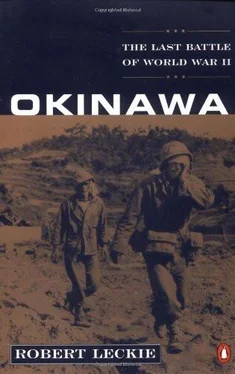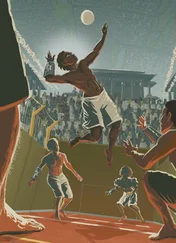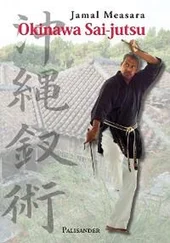“Oh, yeah? Well, if anybody does—it’ll be me!”
This mood of incredulity at the ease of the landing was a common sensation among the Americans as Love Day turned into Honeymoon Week on Okinawa. It was even more pronounced in the north, where only Colonel Udo and his men stood between the Marine divisions and their objectives. For the First, with its memories of fierce battle, the Great Loo Choo was an unbelievable but lovely frolic. In the afternoon General Del Valle called a press conference to tell the correspondents: “I don’t know where the Japs are, and I can’t offer you any good reason why they let us come ashore so easily. We’re pushing on across the island as fast as we can move the men and equipment.” They were, and in two days of “fighting” the First’s casualties totaled three dead and eighteen wounded. On April 3 the division’s jubilant Marines stood on the eastern seawall overlooking the bay and the Pacific Ocean. That same day scouting parties entered the narrow finger of the Katchin Peninsula, traversing it without opposition. Encouraged, General Buckner lifted all restrictions on the rampaging First, and the division rapidly secured all the east coast between Yontan Airfield and the Ishikawa Isthmus, that narrow neck of land about two miles wide lying two-fifths of the way up Okinawa’s slender length. In four days, the First had taken territory expected to require three weeks of savage fighting.
To the north, the Sixth was running into steadily stiffening opposition, ambushes, and isolated attacks on strongpoints—skirmishes real enough to those who fought in them, especially those who died or fell wounded—but not in sufficient strength to slow the Sixth’s rapid advance. After the division had sealed off the northern side of Ishikawa, its men started marching north for Zampa Cape at route-step speed. The First would clean up behind the Sixth, and also attend to the problem of the Okinawan refugees now clogging the roads.
There were so many of them: women with babies at their breasts; children without parents; grizzle-bearded ancients hobbling along with bent backs, leaning on staffs and carrying pitiful small bundles representing all that the war had left them, that terrible war that had also robbed them of the authority of their beards and had exposed them to Japanese mockery and American pity; and the old white-haired women who could not walk, who merely squatted in the road, shriveled, frail, hardly bigger than monkeys, waiting to be carried, waiting for the kind Marine who might stop and stick a lighted cigarette between their toothless gums.
They were a docile people, and now they were terrified because the Japanese had told them the Americans would torture them. They were frightened also because they knew that among them were Japanese soldiers disguised as civilians. But their fear vanished with gentle treatment, with the policy of carefully searching all males between fifteen and forty-five—to discover many a knife or cartridge belt beneath a smock—and of placing all of these within prisoner-of-war camps. Soon the Okinawans were speaking openly of their hatred for the Japanese, their loathing for the Reign of Radiant Peace.
“Nippon ga maketa,” they said. “Japan is finished.”
Marines of the Sixth Division were still marching rapidly north, sweeping up both coasts,. a regiment to either side, and making giant strides daily. Tanks packed with grinning riflemen rolled up the narrow, dusty roads unimpeded but for an occasional sniper, a hastily built and unforbidding roadblock that bulldozers or the tanks themselves could easily shove aside, or here and there an obviously freshly planted land mine that could be detonated with a well-aimed rifle shot.
On April 8 the tanks in the lead came to the mouth of the Motobu Peninsula, a wild headland jutting into the East China Sea on the left, or west of the Marines. Here the Americans discovered why it was that they had moved so easily north. On Motobu were gathered almost all of the two thousand soldiers remaining to Colonel Udo. They were holed up on twelve-hundred-foot Mount Yaetake, among the well-chosen and well-fortified labyrinth of cave-eaten ridges, cliffs, gorges, steep hills, and rocky corridors—well supplied with guns, prepared to fight to the end.
The Marines moved in. They pushed cautiously around the coastal roads, their engineers swiftly building bridges over the ruins of those demolished by the Japanese or trucking in loads of rock and dirt to fill tank-traps blasted at the foot of cliffs or out in the rice paddies. By April 13 they had driven the Japanese back onto the crest of the Yaetake stronghold. They were prepared to attack in a pincers, three battalions to begin a fighting climb from Motobu’s west coast, two to strike from the east.
With first light on Friday the thirteenth on Okinawa, these Marines of the Sixth Division were startled, then grief-stricken, to hear the bullhorns of the ships offshore blaring:
“Attention! Attention! All hands! President Roosevelt is dead. Repeat, our supreme commander, President Roosevelt, is dead.”
Swiftly the news reached the men out of earshot. Many of them cried, most of them prayed. So many of these youths had known no president other than Franklin Delano Roosevelt. They had truly loved him, had depended on him—how much they did not know until they heard that he was dead. Nor could they turn for solace to company officers, barely a few years their senior. They could ask only: “What do we do now?”
Memorial services might be possible on ships even now flying the flag at half-mast, but the Marines on Motobu could do nothing but move out.
The Yaetake attacks became a week-long nightmare against a phantom enemy. Everywhere in the hills were small groups of Japanese clustering around a Hotchkiss heavy machine gun and the usual proliferation of Nambu lights. Marines might grenade these nasty spitting nests, might call down exact mortar fire, but then, in the succeeding rush, might find nothing but a trail of blood to suggest that anyone had struck at them.
“Jeez!” a Marine swore. “They’ve all got Nambus, but where the hell are they?”
On April 15 naval gunfire and close-up air strikes grew stronger. More artillery was brought in. Artillery observers went forward, among them a battery commander and his spotter, Pfc. Harold Gonsalves. The commander lived because Gonsalves hurled himself on a Japanese grenade to save him—and win the Medal of Honor. [7] Here is perhaps the most moving of all the phenomena of the war: the self-sacrifice of noble and brave young American fighting men who smothered enemy grenades with their bodies to save their buddies. Yet, discussing this once with a group of teachers, I had just begun to quote Jesus Christ’s dictum “Greater love than this no man hath, that a man lay down his life for his friends,” when one of them angrily interrupted me. “Nonsense!” he cried in scorn. “Who would do such a crazy thing?” Glaring at me, he asked with heavy sarcasm, “Would you?” I replied, “I might. But never to save someone like you.”
More and more guns lashed at Yaetake.
Next day the Marines drove deeper into the Japanese complex. Corporal Richard Bush led a squad forward on the right flank of the three-battalion line, striking at Yaetake’s eastern mass. The face of the opposing ridge erupted with gunfire. Bush’s squad went up and over it to drive the Japanese out, to score the first breakthrough. But Bush was badly wounded. He was pulled back to a cluster of protecting rocks where other men lay. A grenade sailed in. Bush pulled it to him. He saved the other wounded and he also lived, to join that amazing company of Marines whose Medals of Honor testified to the toughness of their bodies. Through the hole his squad had cut, through other holes along the line, the fight marched upward—swirling up in the mountains where it became as much a matter of supply as killing the enemy.
Читать дальше










